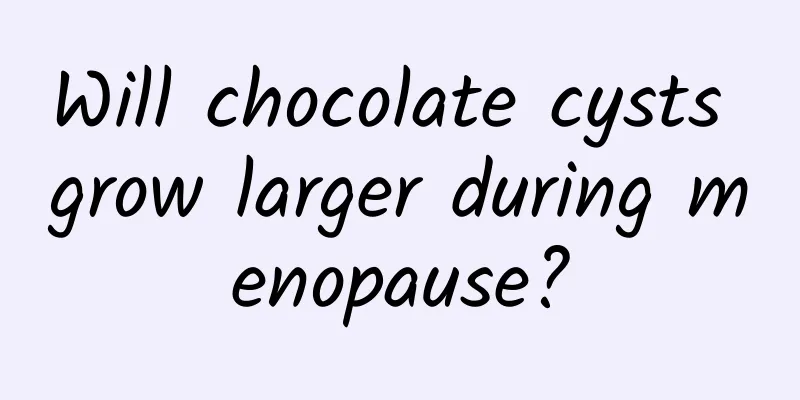Will chocolate cysts grow larger during menopause?

|
During menopause, chocolate cysts may increase in size due to hormonal changes in the body. The increase in size of the cyst is usually related to factors such as estrogen levels in the body, the duration of the cyst, and personal constitution. By adjusting lifestyle habits, drug treatment, and surgical intervention, the cyst can be effectively controlled to prevent further development of the disease. 1) The impact of estrogen fluctuations on cysts During menopause, the estrogen level in women may still fluctuate. Unstable hormone levels may stimulate the continued activity of the cyst and even the expansion of the size. This is mainly because the nature of chocolate cysts is endometriosis cysts, which are affected by estrogen changes. If you experience periodic abdominal pain, bloating and other obvious discomfort, it is recommended to see a doctor as soon as possible to detect changes in the cyst. 2) Cyst duration and autoimmune response If chocolate cysts exist for a long time before menopause, due to the stimulation of repeated inflammation, they may gradually increase in size or cause complications, such as cyst rupture or adhesion. At the same time, as women age, their immune function decreases, which may also provide conditions for the development of cysts. If symptoms such as fatigue and indigestion occur, you need to be vigilant and actively check the cyst condition. 3) Methods of controlling cysts (1) Drug treatment: Postmenopausal women can use gonadotropin-releasing hormone (GnRH) inhibitors to suppress estrogen levels and control further growth of cysts. Other drugs such as progesterone and contraceptives can also be used depending on the situation, but they must be strictly followed according to the doctor's advice. (2) Surgical treatment: For large chocolate cysts with symptoms, the cyst can be removed through laparoscopic surgery, which is a less invasive and quicker recovery method. In severe cases, it may be necessary to consider removing the ovaries or uterus. (3) Lifestyle adjustment: It is recommended to reduce the intake of high-hormone foods, maintain a balanced diet, and supplement with foods rich in fiber and vitamins; at the same time, exercise moderately and maintain good physical fitness to help improve immunity. The changes of chocolate cysts during menopause need to be taken seriously. Regular check-ups can help track the condition and prevent the cysts from posing a greater threat to health. If you experience obvious discomfort, please consult a doctor as soon as possible and choose an appropriate treatment plan to minimize the risk. Paying attention to body signals and managing health scientifically are the keys to avoiding similar problems in the long run. |
<<: What foods can help adults recover faster from influenza?
>>: What are the symptoms of uterine cysts
Recommend
What are the harms of uterine effusion to the body?
In the eyes of many women, uterine effusion is co...
Is hyperprolactinemia caused by pregnancy?
Many women are afraid of suffering from hyperprol...
Symptoms of vulvar leukoplakia in women
Is vulvar leukoplakia a gynecological disease? Ma...
Commonly used drugs for treating dysmenorrhea
Commonly used medications for dysmenorrhea: 1. Ge...
Reduce waist and belly without asking for help! Ballroom dance queen Liu Zhen reveals her postpartum slimming exercises
The Queen of National Standard's private slim...
Pregnant women's daily diet calories are 30 kcal per kilogram
How many calories does a pregnant woman need in a...
What are the steps in diagnosing miscarriage?
Abortion is divided into early abortion and late ...
What does bilateral polycystic ovary mean?
Polycystic changes in both ovaries are one of the...
Feet are the second heart. 10 tips for daily walking
Although road running is very popular recently, b...
Dietary taboos for uterine fibroids? Patients with uterine fibroids cannot eat high-fat diets
Uterine fibroids are one of the common genital di...
Which hospital in Shenzhen is better for gynecology?
According to the latest medical report, 80% of ma...
Getting up at 8 o'clock in the morning and basking in the sun is good for weight loss! A helping hand for a good metabolism
Do you prefer to get up early in the morning and ...
Three types of vulvar leukoplakia
Vulvar leukoplakia is a common and frequently occ...
Are the bleeding symptoms of cervical erosion serious? How to treat cervical erosion patients?
In life, the most common and main symptom of cerv...
What are the points that should be paid special attention to after the treatment of chronic cervicitis
Patients are often not very clear about the preca...









